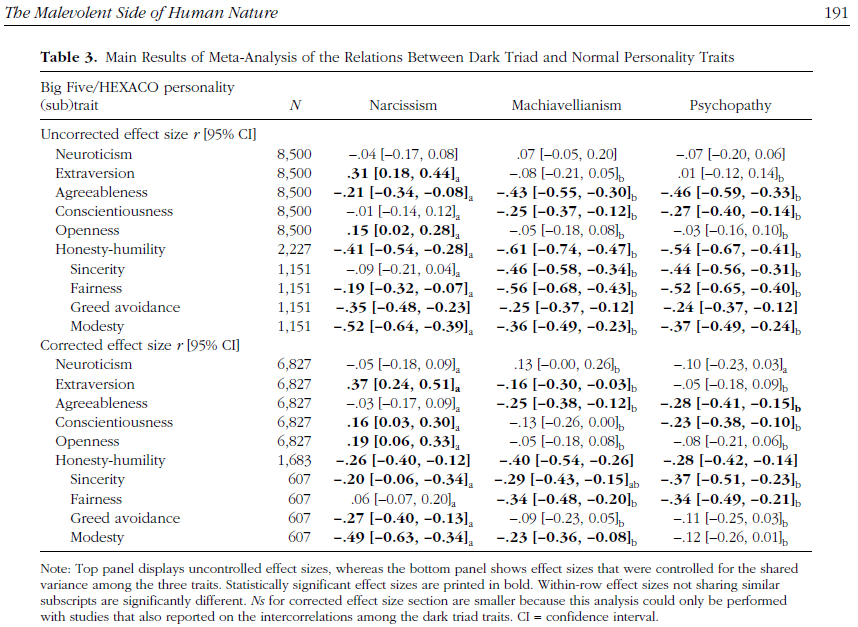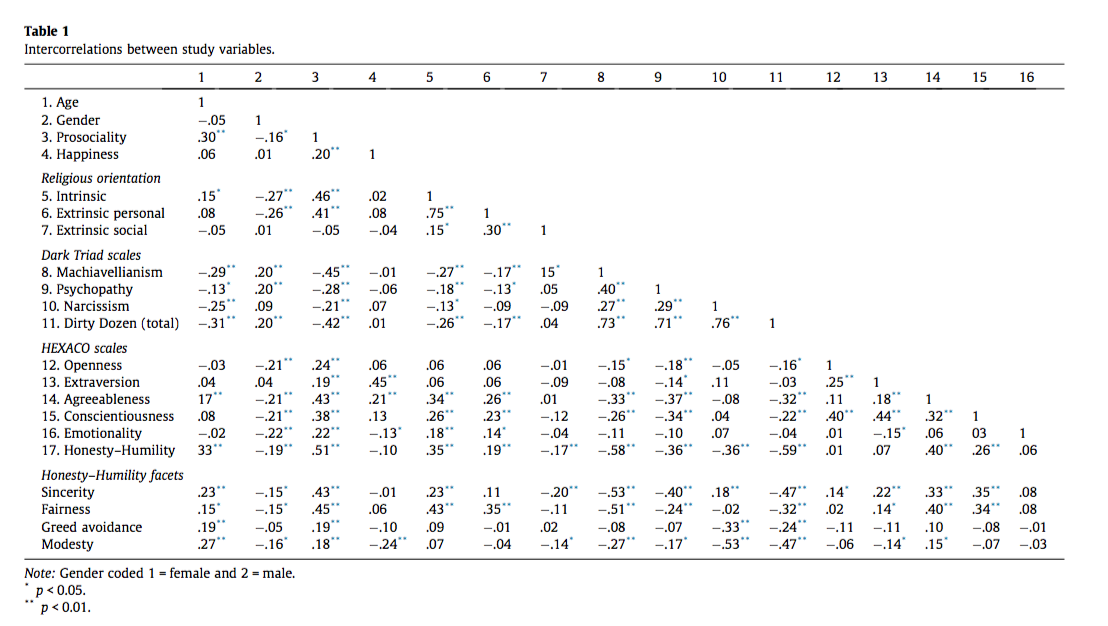There's now a meta-analysis by Muris et al. (2017) which is a little more fine grained because also takes into account intercorrelation between these three; i.e. Muris et al. report effect sizes both uncorrected and corrected (for shared variance).

There are somewhat obvious (at least for the uncorrected effects) conclusions that the authors draw:
As anticipated, the relations between honesty-humility
and the dark triad traits were all negative and of a moderate
to large effect size. Thus, in general, narcissism,
Machiavellianism, and psychopathy are associated with
low levels of positive attributes such as truthfulness, honesty,
fairness, sincerity, and faithfulness, which is not surprising
as each dark trait can be described in terms of the
precise opposites of these characteristics (Ashton et al.,
2000). As can be seen in Table 3, the negative link with
honesty-humility was significantly stronger for Machiavellianism
and psychopathy than for narcissism (rs being
-.61 and -.54 versus -.41, respectively). This was especially
true for the facets of sincerity and fairness, which
were more strongly negatively linked to Machiavellianism
and psychopathy, but not for the facet of modesty, which
was more substantially negatively associated with narcissism.
Thus, Machiavellianism and psychopathy are primarily
related to dishonesty and falsehood, whereas
narcissism is predominantly linked to arrogance and
haughtiness (e.g., Aghababaei, Mohammadtabar, &
Saffarinia, 2014; Jonason & McCain, 2012).
When controlling for the shared variance among the
dark triad traits, we found a similar picture (see lower
panel of Table 3). That is, narcissism was positively associated
with extraversion and openness, Machiavellianism
was negatively related to agreeableness, and psychopathy
was negatively linked to agreeableness and conscientiousness.
All dark traits remained statistically negatively
associated with honesty-humility (with narcissism being
more clearly connected to lack of greed avoidance and
modesty, and Machiavellianism and psychopathy being
more convincingly associated with lack of sincerity and
fairness). Yet, controlling for shared variance resulted in
attenuated effect sizes (i.e., uncorrected rs between -.41
and -.61 vs. corrected rs between -.26 and -.40). Two
new relations attained statistical significance once we
controlled for the shared variance among dark triad traits:
Machiavellianism was negatively associated with extraversion
(r = -.16), while narcissism was positively related
to conscientiousness (r = .16). We can only speculate
about the meaning of these relations. Thus, the lower
levels of extraversion in Machiavellianism fit with the
often covert manipulations that are thought to be typical
for this trait. The relatively higher levels of conscientiousness
that accompany narcissism may serve the effective
pursuit of admiration from others.
In the table above they combined 3 different tests for the dark triad (to get a larger sample), which perhaps explains why they didn't extract facets. They have another table like the above but split by test as well (SD3, DD, and the older ODTS itself assembled from 3 tests) for the purposes of discussing differences among these tests, but they don't get into facets. They do note lower correlations with H when using SD3 and DD and conclude that
these [newer, briefer] measures [SD3, DD] are not capable of assessing all aspects of the dark triad traits as well as the extended original questionnaires
They also point out that MACH-IV (ODTS) had a small positive correlation with neuroticism, but this becomes negative with SD3, which they could not really explain other than by "employment of different instruments".

